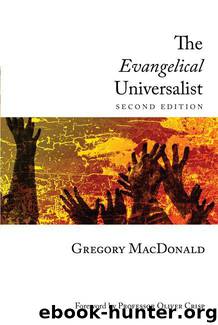The Evangelical Universalist by Gregory MacDonald & Oliver D. Crisp

Author:Gregory MacDonald & Oliver D. Crisp [MacDonald, Gregory & Crisp, Oliver D.]
Language: eng
Format: epub
Tags: Christian Books & Bibles, Theology, Religion & Spirituality, Religious Studies, Religious Studies & Reference
ISBN: 9781621893059
Amazon: B008AVNFQM
Publisher: Cascade Books, an imprint of Wipf and Stock Publishers
Published: 2012-05-11T07:00:00+00:00
CHAPTER SIX
To Hell and Back
But as children are punished by their teacher or their father, so we are punished by Providence. Now God does not exact vengeance (for vengeance is retribution for evil),1 but rather he punishes for the good, both public and private, of those who are being punished.
—Clement of Alexandria2
THERE CAN be no doubt that the main argument against the evangelical universalism I have defended thus far is the presence of many texts about final judgment and hell found across the New Testament. Any kind of Christian universalist must have something intelligent to say about such passages if he or she desires to be taken seriously as an orthodox Christian. In this chapter I will propose a way of making sense of such teachings that is consistent with universalism.
It seems to me that there are three possible ways a universalist could handle these passages.
a) A universalist could argue that the hell passages really do teach eternal damnation and that they simply contradict the teaching of more universalist texts. Such universalists are arguing that the New Testament teaches contradictory things about the fate of humanity, and the Christian is left to choose the one that feels like the most Christian. One problem is that damnation texts can be found in the writings of those, such as Paul, who also anticipate a more universalist future. Was Paul so muddled in his thinking as not to perceive a contradiction in his teachings?3 Another problem is that much of Jesus’ teaching is about the judgment. Reisner reckons that 25% of the Synoptic teaching of Jesus is about final punishment.4 It is clear that an important part of the teaching of the historical Jesus was warning about eschatological judgment. To reject such notions as sub-Christian would be quite an astonishing claim for any Christian to make. A related problem is that the theme of divine punishment is so pervasive across both Old and New Testaments that to suggest that it was not fully Christian would be a dead-end route. On the other hand, to reject the universalist tendencies as unchristian is also a dead end if the arguments in chapters 1–5 carry weight.
Download
This site does not store any files on its server. We only index and link to content provided by other sites. Please contact the content providers to delete copyright contents if any and email us, we'll remove relevant links or contents immediately.
The Lost Art of Listening by Michael P. Nichols(7506)
Why I Am Not A Calvinist by Dr. Peter S. Ruckman(4153)
The Rosicrucians by Christopher McIntosh(3521)
Wicca: a guide for the solitary practitioner by Scott Cunningham(3179)
Signature in the Cell: DNA and the Evidence for Intelligent Design by Stephen C. Meyer(3138)
Real Sex by Lauren F. Winner(3023)
The Holy Spirit by Billy Graham(2953)
To Light a Sacred Flame by Silver RavenWolf(2823)
The End of Faith by Sam Harris(2742)
The Gnostic Gospels by Pagels Elaine(2531)
Waking Up by Sam Harris(2461)
Nine Parts of Desire by Geraldine Brooks(2369)
Jesus by Paul Johnson(2362)
Devil, The by Almond Philip C(2332)
The God delusion by Richard Dawkins(2309)
Heavens on Earth by Michael Shermer(2284)
Kundalini by Gopi Krishna(2185)
Chosen by God by R. C. Sproul(2164)
The Nature of Consciousness by Rupert Spira(2108)
